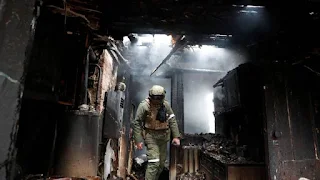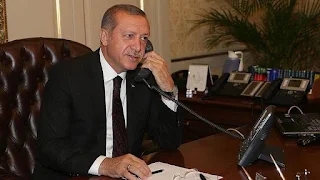Russia insists on continuing the war and the West accuses it of "terrorism" and threatens tougher sanctions
Russian Defense Minister Sergei Shoigu confirmed the continuation of the special military operation in Ukraine until its goals are achieved, while the European Council accused Moscow of terrorism, brandishing more sanctions.
Russian Defense Minister Sergei Shoigu said on Tuesday that his country's armed forces will continue the special military operation in Ukraine until it achieves its goals, while the European Council accused Moscow of "terrorism" and brandished new sanctions.
Shoigu added that Western countries should stop building military facilities in non-NATO countries in the former Soviet Union.
He claimed during a meeting with military officials in the capital, Moscow, that the Western world is using the Ukrainian people in the fight against Russia, saying that "what is important for us is to protect Russia from the military threat posed by Western countries."
He stressed that the Russian army has taken all necessary measures not to harm civilians in the military operation against Ukraine.
In turn, the Russian Foreign Ministry said that the West continues to push Ukraine into war, by supplying it with weapons, according to the Russian Information Agency.
The ministry criticized the behavior of the technology companies "Alphabet" and "Meta", noting that they carried out "anti-Russian propaganda", and considered this unacceptable.
This comes as the West continues to accuse Russia and threaten more sanctions.
European Council President Charles Michel accused Russia of "geopolitical terrorism", in a speech before the European Parliament.
"It is not only Ukraine that is under attack, but also the international law and order based on the rules of democracy and human dignity," Michel said.
"It is plain and simple geopolitical terrorism," he continued.
The President of the European Council announced the imposition of new sanctions against Russia that will affect its maritime sector, saying: "The ban on the arrival of Russian ships to British ports will enter into force," but without revealing a specific date.
And Michel indicated that the sanctions against Russia were "necessary", despite the repercussions they bear on the European Union countries.
It is not only Europe. British Prime Minister Boris Johnson stressed during a visit to Poland on Tuesday that Russian President Vladimir Putin will "be held responsible" for any war crimes in Ukraine, warning that Western countries are ready to "toughen" sanctions against Russia if necessary.
“Vladimir Putin has underestimated the unity and resolve of the West and the rest of the world,” Johnson said. “We will continue the economic pressure. It is clearly having a severe impact, and we are ready to intensify it and continue it as needed.”
In Warsaw, Johnson met his Polish counterpart, Mateusz Morawiecki, who expressed solidarity with Ukraine and thanked "all British soldiers who are helping us on Polish soil".
Earlier on Tuesday, British Deputy Prime Minister Dominic Raab said: "It is clear to Putin and the leaders in Moscow as well, on the ground in Ukraine, that they will be held accountable for any violation of the laws of war," adding: "We will not simply ignore it."
And the British Treasury decided to include "Sberbank", the largest Russian credit bank, on its list of Russian entities subject to sanctions against the backdrop of the invasion of Ukraine, warning that the costs of the invasion of Ukraine would rise for the Kremlin.
At the dawn of last February 24, Russia launched a military operation in Ukraine, which was followed by angry international reactions and the imposition of "tough" economic and financial sanctions on Moscow.
Russian President Vladimir Putin accused what he called the "leading countries" in the North Atlantic Treaty Organization (NATO) of supporting what he described as the "neo-Nazis of Ukraine".
To discuss the Ukrainian crisis, Erdogan is in contact with the Netherlands and Austria
Turkish President Recep Tayyip Erdogan discussed with his Austrian counterpart and Dutch Prime Minister the Russian military intervention in Ukraine.
According to the statement of the Turkish Presidency Communication Department, Erdogan confirmed, in a telephone conversation with Dutch Prime Minister Mark Rutte, that efforts will continue to achieve an urgent ceasefire between Russia and Ukraine.
At the same time, the Turkish president stressed support for Ukraine's sovereignty and territorial integrity, and the two sides discussed bilateral relations between the two countries.
In another phone call with his Austrian counterpart Alexander van der Bellen, Erdogan discussed Russian military intervention against Ukraine, and bilateral relations.
During the call, Erdogan stressed that Turkey has made every effort to establish a ceasefire between Russia and Ukraine, restore peace and improve the humanitarian situation.
He pointed out that Turkish-Austrian relations are capable of developing at all levels, noting that the Turks living in Austria have contributed a lot to developing the ties between the two societies.
Erdogan reiterated that recent developments reveal how important Turkey is to Europe's security.
He also made it clear that Ankara expects to take concrete and meaningful steps in relations with the European Union, including the start of negotiations on the modernization of the customs union and progress on visa abolition for Turkish citizens.
At the dawn of last February 24, Russia launched a military operation in Ukraine, which was followed by angry international reactions and the imposition of "tough" economic and financial sanctions on Moscow.
Tags:
britain
europe
european countries
european union
france
paris
russia
ukraine
ukraine conflict
ukraine war
ukrainian coup
ukrainian crisis




